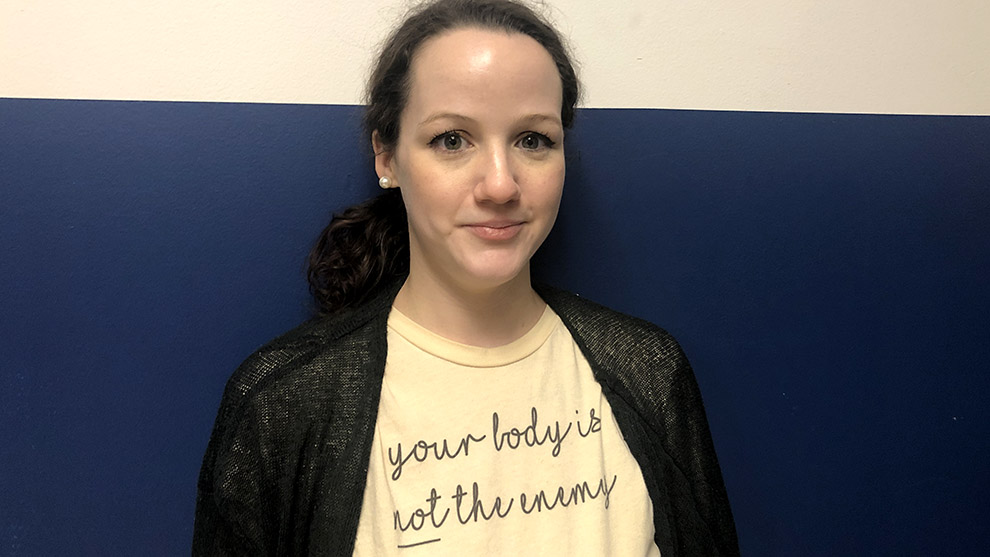Halifax woman calls out diet culture for applauding disordered eating
‘Sometimes people treat weight loss as if it’s the most important thing a person can do’

caption
Chasity St. Louis with a shirt that says "your body is not the enemy."When Chasity St. Louis was living with anorexia, she got compliments instead of concern.
St. Louis, 31, developed an eating disorder in junior high school. She said she was overweight and made the decision to go on a diet, which led to disordered eating.
She began losing weight as she restricted and cut out food.
“Because I started dieting when I was in a larger body people didn’t see that as concerning. They saw it as something to be applauded. Something to be encouraged,” she said.
“Sometimes people treat weight loss as if it’s the most important thing a person can do.”
Friday marked the end of Eating Disorders Awareness Week. Over the last few days, Eating Disorders Nova Scotia hosted a slew of events across the city to raise awareness for disordered eating.
St. Louis described her weight loss as problematic and dangerous. She said once you deprive your body and mind of food, it becomes hard to rationalize your behavior.
“It’s hard to live in a society where in the media, magazines, TV, where this ideal is projected and to feel you don’t match that,” she said.
Eating disorders are illnesses just like many mental illnesses. But their symptoms are often causally discussed every day in lunch rooms, media and conversations among friends.
Shaleen Jones, the executive director of Eating Disorders Nova Scotia, said symptoms like restriction and removing food groups are encouraged and praised within diet culture.
“It would be like if you struggle with depression, everyone’s like, ‘The best thing I did today was stay in bed and I cried and I felt nothing, felt numb and it was awesome,’” said Jones.
Jones said people talk about intermittent fasting or not eating for a week as if it’s conversational and normal.
She said Eating Disorder Awareness Week exists so people can talk about eating disorders and find support and recovery. She said it’s no different than Bell Let’s Talk Day.
“Eating disorders thrive in silence and shame and stigma,” said Jones.
According to a 2014 report about eating disorders from the Standing Committee on the Status of Women, between 600,000 to 990,000 Canadians meet the criteria for an eating disorder at any time.
“Weight stigma and diet culture reinforce eating disorder behaviours. And they mask it so much that people who are at a larger body size are extra encouraged to do these behaviors,” said Jones.
Diet culture perpetuates new diets and ways to lose weight, often without anyone acknowledging what happens during and after this process, and why it needs to occur in the first place. Diet culture becomes a commonality with eating disorders and weight stigma, said Jones.
“One thing you can do to create a better world for all of us is to start calling out diet culture when you see it,” she said.
She said we need to look critically at the beliefs Western culture holds around weight and size. She also said we need to see if health biases are based on good evidence.
“It’s really hard to recover from an eating disorder in a world that’s telling that what you’re doing is great,” said Jones.
Jones said there’s a lot of pain for people with eating disorders, and that is a part of the recovery process. She also said the majority of people who get support for an eating disorder make a full recovery.
“They impact so many people and yet they’re hidden in plain sight because of this cultural nonsense,” said Jones.
St. Louis said recovery has allowed her to take back control of her life and her health. For her, health means she’s not restricting food.
She stressed that anyone can develop an eating disorder.
“You can’t really judge whether or not someone has an eating disorder just by looking at their body because we have the stereotype that people who have eating disorders are thin, white middle class women,” said St. Louis. “But that’s not true at all. It affects everyone.”
If you are struggling with an eating disorder, need support or want to volunteer you can reach out to Eating Disorders Nova Scotia.
About the author
Kristina Pappas
Kristina Pappas is a journalism student. She's from western Canada and is smitten with the east coast's charm. You can find her at a beach, exploring...
